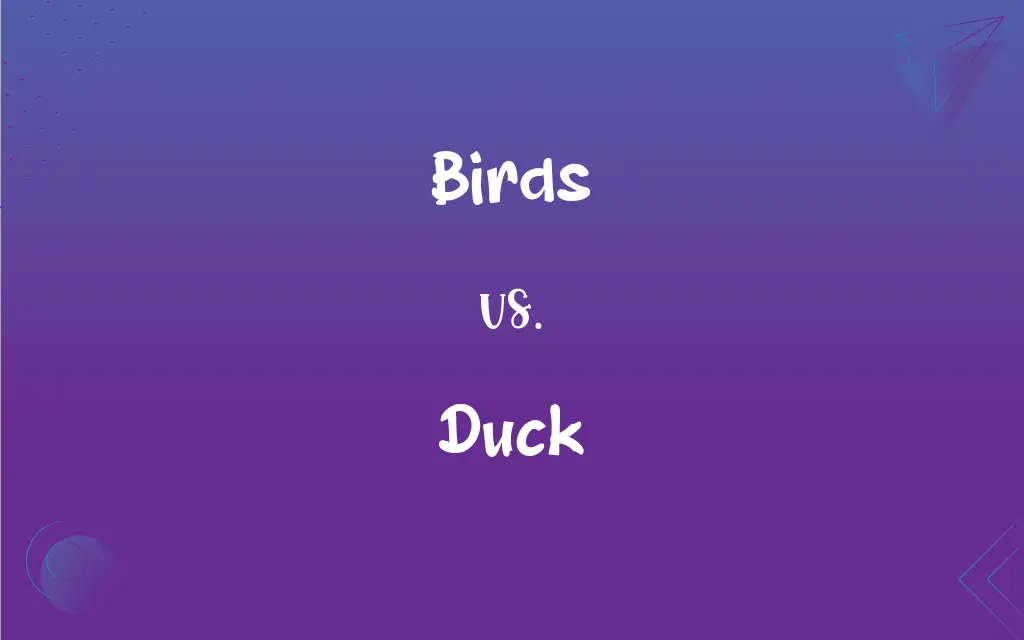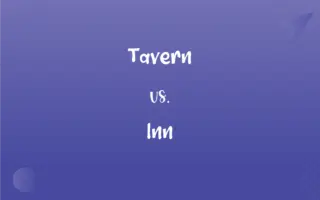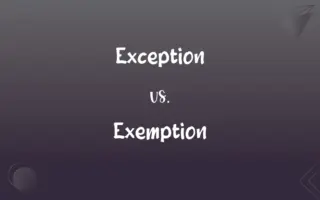Birds vs. Duck: What's the Difference?
Edited by Harlon Moss || By Janet White || Updated on September 23, 2023
Birds are a group of warm-blooded vertebrates constituting the class Aves, while a duck is a specific waterfowl species within this class.

Key Differences
Birds represent a diverse class, Aves, encompassing a wide range of species exhibiting variations in size, habitat, diet, and behavior. They are characterized by feathers, beaks, and laying of hard-shelled eggs, and they are found globally from the Arctic to the Antarctic. Birds exhibit an extensive array of adaptations, allowing them to inhabit varied environments, including terrestrial, aerial, and aquatic ecosystems. The term "birds" is thus a broad classification that includes numerous species, each with its unique set of characteristics.
A duck, on the other hand, is a specific member of the bird class, predominantly associated with aquatic environments. Ducks are part of the family Anatidae and are known for their dabbling behavior in water bodies. Unlike the general bird population, ducks have specialized features like webbed feet for swimming and a unique bill structure, allowing them to filter feed in water. Ducks, being a subset of birds, exhibit a narrowed set of characteristics and behaviors in alignment with their ecological niche.
The diversity in the bird class is profound, with members ranging from flightless penguins to soaring eagles, and their adaptability allows them to colonize diverse habitats. Birds play crucial ecological roles, such as pollinators, predators, scavengers, and prey, contributing to the balance of their respective ecosystems. Their presence or absence in an ecosystem often serves as an indicator of environmental health and stability.
In contrast, ducks exhibit a more streamlined set of roles and characteristics due to their specialization in aquatic habitats. They primarily inhabit wetlands, lakes, and rivers, contributing to the ecosystems by being primary consumers and acting as prey for numerous aquatic predators. Ducks hold significance in human culture as well, being domesticated for various purposes, including meat, eggs, and feathers.
In essence, while "birds" refers to an overarching category inclusive of varied species with distinctive attributes, "duck" signifies a specific species within this class, having characteristics and behaviors adapted to aquatic life. The broad scope of birds' classification encompasses the specificity of ducks, illustrating the hierarchical nature of biological classification.
ADVERTISEMENT
Comparison Chart
Classification
A diverse class constituting various species.
A specific species within the class Aves.
Habitat
Inhabit varied ecosystems globally.
Primarily associated with aquatic environments.
Characteristics
Exhibit a wide range of characteristics.
Have specialized features like webbed feet.
Ecological Roles
Play varied ecological roles.
Contribute to aquatic ecosystems as consumers and prey.
Relationship to Humans
Diverse relationships including pets and wild species.
Domesticated for meat, eggs, and feathers.
ADVERTISEMENT
Birds and Duck Definitions
Birds
Warm-blooded egg-laying vertebrates with feathers.
Birds like eagles are known for their excellent vision.
Duck
A bird with webbed feet and a broad flat beak.
The duck dabbled in the pond, looking for food.
Birds
Avian species capable of flight due to the presence of wings.
Birds like hummingbirds can hover in mid-air by rapidly flapping their wings.
Duck
Domesticated primarily for its meat, eggs, and feathers.
The Pekin duck is a domesticated species popular for its meat.
Birds
Creatures with a high metabolic rate and a strong yet lightweight skeleton.
Birds like penguins have adapted to life in the Antarctic.
Duck
Any of various wild or domesticated waterbirds of the family Anatidae, characteristically having a broad flat bill, short legs, and webbed feet.
Birds
Species with a four-chambered heart and a strong yet lightweight beak.
The ostrich is one of the largest species of birds and is flightless.
Duck
A female duck.
Birds
Any of various warm-blooded egg-laying feathered vertebrates of the class Aves, having forelimbs modified to form wings.
Duck
The flesh of a duck used as food.
Birds
Such an animal hunted as game.
Duck
(Slang) A person, especially one thought of as peculiar.
Birds
Such an animal, especially a chicken or turkey, used as food
Put the bird in the oven.
Duck
Often ducks (used with a sing. verb) Chiefly British A dear.
Birds
See clay pigeon.
Duck
A quick lowering of the head or body.
Birds
(Sports) See shuttlecock.
Duck
A plunge under water.
Birds
(Slang) A rocket, guided missile, satellite, or airplane.
Duck
A durable, closely woven heavy cotton or linen fabric.
Birds
(Slang) A person, especially one who is odd or remarkable
A sly old bird.
Duck
Ducks Clothing made of duck, especially white pants.
Birds
Chiefly British Slang A young woman.
Duck
An amphibious military truck used during World War II.
Birds
A loud sound expressing disapproval; a raspberry.
Duck
A similar vehicle used for civilian purposes, as to evacuate flood victims or for sightseeing tours. In both senses also called DUKW.
Birds
Discharge from employment
Lost a big sale and nearly got the bird.
Duck
To lower quickly, especially so as to avoid something
Ducked his head as the ball came toward him.
Birds
An obscene gesture of anger, defiance, or derision made by pointing or jabbing the middle finger upward.
Duck
To evade; dodge
Duck responsibility.
Ducked the reporter's question.
Birds
To observe and identify birds in their natural surroundings.
Duck
To push (a person, for example) suddenly under water.
Birds
To trap, shoot, or catch birds.
Duck
In bridge, to deliberately play a card that is lower than (an opponent's card).
Birds
Plural of bird
Duck
To lower the head or body.
Birds
Animals of the class Aves, characterized by a beak with no teeth.
Many birds, such as robins, are known for their melodious songs.
Duck
To move swiftly, especially so as to escape being seen
Ducked behind a bush.
Duck
To submerge the head or body briefly in water.
Duck
To evade a responsibility or obligation. Often used with out
Duck out on one's family.
Duck
In bridge, to lose a trick by deliberately playing lower than one's opponent.
Duck
(intransitive) To quickly lower the head or body, often in order to prevent it from being struck by something.
Duck! There's a branch falling off the tree!
Duck
(transitive) To quickly lower (the head or body), often in order to prevent it from being struck by something.
Duck
(transitive) To lower (something) into water; to thrust or plunge under liquid and suddenly withdraw.
Duck
(intransitive) To go under the surface of water and immediately reappear; to plunge one's head into water or other liquid.
Duck
(intransitive) To bow.
Duck
(transitive) To evade doing something.
Duck
(transitive) To lower the volume of (a sound) so that other sounds in the mix can be heard more clearly.
Duck
(intransitive) To enter a place for a short moment.
I'm just going to duck into the loo for a minute, can you hold my bag?
Duck
(caving) A cave passage containing water with low, or no, airspace.
Duck
An aquatic bird of the family Anatidae, having a flat bill and webbed feet.
Duck
Specifically, an adult female duck; contrasted with drake and with duckling.
Duck
(uncountable) The flesh of a duck used as food.
Duck
(cricket) A batsman's score of zero after getting out. (short for duck's egg, since the digit "0" is round like an egg.)
Duck
(slang) A playing card with the rank of two.
Duck
A building intentionally constructed in the shape of an everyday object to which it is related.
A luncheonette in the shape of a coffee cup is particularly conspicuous, as is intended of an architectural duck or folly.
Duck
A marble to be shot at with another marble (the shooter) in children's games.
Duck
(US) A cairn used to mark a trail.
Duck
One of the weights used to hold a spline in place for the purpose of drawing a curve.
Duck
Synonym of lame duck
Duck
(medicine) A long-necked medical urinal for men.
Duck
A faggot; a meatball made from offal.
Duck
A tightly-woven cotton fabric used as sailcloth.
Duck
(in plural) Trousers made of such material.
Duck
A term of endearment; pet; darling.
Duck
(Midlands) Dear, mate (informal way of addressing a friend or stranger).
Ay up duck, ow'a'tha?
Duck
A pet; a darling.
Duck
A linen (or sometimes cotton) fabric, finer and lighter than canvas, - used for the lighter sails of vessels, the sacking of beds, and sometimes for men's clothing.
Duck
The light clothes worn by sailors in hot climates.
Duck
Any bird of the subfamily Anatinæ, family Anatidæ.
Duck
A sudden inclination of the bead or dropping of the person, resembling the motion of a duck in water.
Here be, without duck or nod,Other trippings to be trod.
Duck
To thrust or plunge under water or other liquid and suddenly withdraw.
Adams, after ducking the squire twice or thrice, leaped out of the tub.
Duck
To plunge the head of under water, immediately withdrawing it; as, duck the boy.
Duck
To bow; to bob down; to move quickly with a downward motion.
Duck
To go under the surface of water and immediately reappear; to dive; to plunge the head in water or other liquid; to dip.
In Tiber ducking thrice by break of day.
Duck
To drop the head or person suddenly; to bow.
The learned pateDucks to the golden fool.
Duck
Small wild or domesticated web-footed broad-billed swimming bird usually having a depressed body and short legs
Duck
(cricket) a score of nothing by a batsman
Duck
Flesh of a duck (domestic or wild)
Duck
A heavy cotton fabric of plain weave; used for clothing and tents
Duck
To move (the head or body) quickly downwards or away;
Before he could duck, another stone struck him
Duck
Submerge or plunge suddenly
Duck
Dip into a liquid;
He dipped into the pool
Duck
Avoid or try to avoid fulfilling, answering, or performing (duties, questions, or issues);
He dodged the issue
She skirted the problem
They tend to evade their responsibilities
He evaded the questions skillfully
Duck
A waterfowl species found in both freshwater and seawater.
The mallard is a common species of duck found in many parts of the world.
Duck
A member of the family Anatidae.
A duck has specialized glands to keep its feathers waterproof.
Duck
A bird adapted to swimming, floating on water, and diving.
The duck dove underwater to catch its prey.
FAQs
Are ducks only found in freshwater bodies?
No, some species of ducks inhabit both freshwater and seawater.
Do all ducks have webbed feet?
Yes, ducks have webbed feet to aid in swimming.
Are all birds warm-blooded?
Yes, all birds are warm-blooded vertebrates.
Are all birds capable of flight?
No, some birds like ostriches and penguins are flightless.
Do all birds have feathers?
Yes, one of the defining characteristics of birds is the presence of feathers.
Are all ducks dabblers?
No, while many ducks are dabblers, some are divers.
Are ducks omnivorous?
Yes, ducks are omnivorous, eating plants, insects, and small fish.
Are ducks social birds?
Yes, many ducks are social and often live in groups.
Can all birds sing?
Not all birds sing, but many use vocalizations for communication.
Do ducks have teeth?
Ducks do not have teeth but have serrated edges in their beaks called lamellae.
Do all birds lay eggs?
Yes, all birds reproduce by laying eggs.
Can all birds swim?
Not all birds can swim; many are adapted to flying or running.
Are all birds vertebrates?
Yes, all birds are vertebrates with a backbone.
Are birds the only animals with feathers?
Yes, feathers are unique to birds.
Can ducks fly long distances?
Many duck species are migratory and can fly long distances.
About Author
Written by
Janet WhiteJanet White has been an esteemed writer and blogger for Difference Wiki. Holding a Master's degree in Science and Medical Journalism from the prestigious Boston University, she has consistently demonstrated her expertise and passion for her field. When she's not immersed in her work, Janet relishes her time exercising, delving into a good book, and cherishing moments with friends and family.
Edited by
Harlon MossHarlon is a seasoned quality moderator and accomplished content writer for Difference Wiki. An alumnus of the prestigious University of California, he earned his degree in Computer Science. Leveraging his academic background, Harlon brings a meticulous and informed perspective to his work, ensuring content accuracy and excellence.































































